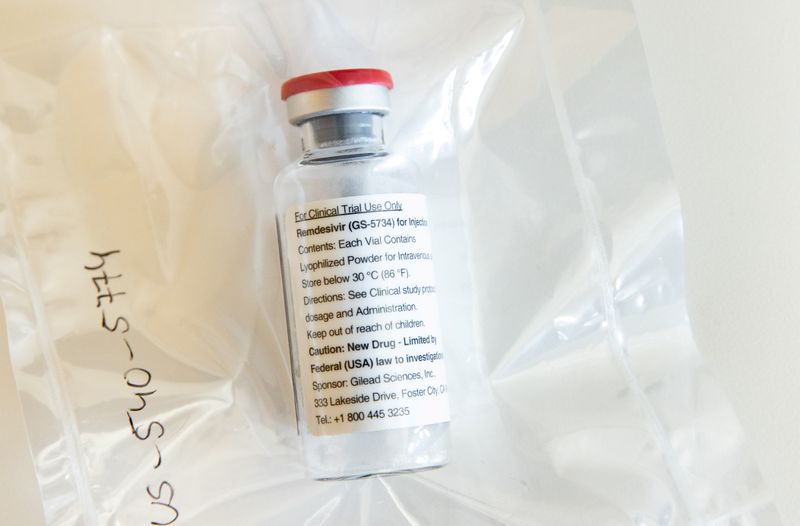By Deena Beasley
(Reuters) - A key U.S. government trial of Gilead Sciences Inc 's (O:GILD) experimental coronavirus treatment may yield results as early as mid-May, according to the study's lead investigator, after doctors clamored to enroll their patients in the study.
Preliminary findings from the randomized trial of the antiviral drug remdesivir, begun in February by the National Institute of Allergy and Infectious Diseases (NIAID), could come even sooner, lead researcher Dr. Andre Kalil told Reuters in an interview. There are currently no approved treatments or vaccines for COVID-19, the respiratory illness caused by the new virus that has killed over 190,000 people globally, according to a Reuters tally.
Remdesivir has drawn tremendous attention as a therapy with the potential to alter the course of the disease, based on anecdotal reports that it may have helped some patients.
Those hopes were dampened somewhat on Thursday, when details from a Chinese remdesivir trial in patients with severe COVID-19 inadvertently released by the World Health Organization suggested it provided no benefit.
Gilead pushed back on that interpretation saying the study, which was stopped early due to low patient enrollment, cannot provide meaningful conclusions.
Other reports have provided reason for optimism.
Doctors at Houston Methodist Hospital told Reuters that since March 23, they have treated 41 mostly severely ill COVID-19 patients with the drug. None have died and half are back home. But they and other doctors contacted by Reuters said they need much more information than the few details available from the Chinese trial and anecdotal reports on its emergency use in the United States to form a view on remdesivir.
They emphasized a need to see how patients on remdesivir fare compared to those who do not receive the therapy in a rigorous clinical trial at different stages of illness to know whether and under what circumstances it may provide benefit.
The NIAID trial "has all the necessary scientific standards that are really going to help us define if this drug works or not," said Dr. Kalil, a professor at the University of Nebraska Medical Center. It is a randomized, double-blind study in which half the patients were given the drug and the other half a placebo. Enrollment in the trial closed on Sunday, but has far exceeded initial goals of 400 to 500 patients, he said. The investigator would not disclose total enrollment, but the latest public update says trial size may exceed 800 patients. The NIAID trial is designed to show whether remdesivir, when given to patients with a range of disease severity, improves outcomes such as length of hospitalization, need for mechanical ventilation and survival. Dr. Kalil declined to comment on precisely how much of an improvement on those metrics is needed to deem the trial a success and the drug a viable treatment. "We are looking for not only a statistical difference, but also for a meaningful clinical improvement," he said. "We expect to have results sometime from mid- to late May."
Gilead on Thursday said it expected results from the NIAID trial in late May. The company's shares, up more than 20% so far this year due largely to remdesivir prospects, were 1.7% higher at $79.10 on Friday.
A lack of hard evidence has given U.S. medical associations, as well as the National Institutes of Health, pause. They have not recommended remdesivir to treat COVID-19.
The Infectious Disease Society of America (IDSA), which represents more than 12,000 U.S. specialists, said it will make a formal recommendation once the entire body of evidence for remdesivir is available.
Dr. Rajesh Gandhi, an infectious disease physician at Massachusetts General Hospital in Boston who helped draft the IDSA guidelines, explained that most patients with COVID-19 will recover with little or no medical care. He is awaiting more clinical trial data before remdesivir can be deemed a useful therapy. EARLY INTERVENTION?
In general, doctors say they would expect remdesivir to work better if given early in the course of the disease. The drug, which previously failed as a treatment for Ebola, is designed to keep a virus from replicating in the body and overwhelming a patient's immune system.
"You can put out a campfire, but once it becomes a wildfire it's hard to control," said Dr. Kevin Grimes, an infectious disease specialist at Houston Methodist, which is participating in Gilead studies.
Gilead is leading its own trials of remdesivir, which is given to hospitalized patients as an intravenous infusion: One in patients with severe disease and the other in patients with more moderate symptoms.
The company expanded the number of patients it would enroll in the severe disease trial to 6,000 from 2,400, and expects results at the end of April. But that study does not compare remdesivir to another treatment or placebo.
The medical news website STAT last week reported that nearly all participants in Gilead-sponsored studies at a University of Chicago hospital saw rapid recoveries in fever and respiratory symptoms, and many were discharged in less than a week. The New England Journal of Medicine previously published an analysis showing that two-thirds of a small group of severely ill COVID-19 patients improved after treatment with remdesivir.
But it is impossible to know whether those outcomes can be attributed to the drug in the absence of a control group that did not far as well, since so much is still unknown about this new virus.
Still, these reports provide reason for hope given the desperate need as the virus rampages around the globe.

"We were asked to participate in this trial and we jumped at it," said Grimes. "We see people that are getting sicker and then they get better."